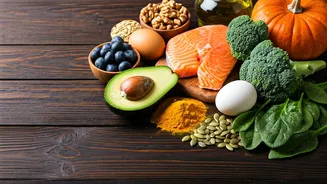Berries for Brains
Berries are a powerhouse when it comes to brain health. These vibrant fruits, including blueberries, strawberries, and raspberries, are rich in antioxidants,
particularly flavonoids. Flavonoids help combat oxidative stress and inflammation, key factors that can contribute to cognitive decline and memory problems. Studies suggest that regularly consuming berries can improve memory, attention, and overall cognitive performance. The antioxidants in berries also help protect brain cells from damage, making them a fantastic addition to any brain-boosting diet. Aim for a handful of berries in your breakfast cereal, yogurt, or as a quick snack.
Fatty Fish Power
Fatty fish, such as salmon, are excellent sources of omega-3 fatty acids, crucial for brain health. Omega-3s, specifically EPA and DHA, are essential components of brain cell membranes, supporting cell structure and function. DHA is particularly vital for memory and learning. Research shows that consuming fatty fish can enhance cognitive function and potentially reduce the risk of cognitive decline associated with aging. Moreover, fatty fish also provides high-quality protein and vitamin D, both of which are beneficial for brain health. Incorporate at least two servings of fatty fish into your weekly diet to gain the best results.
The Power of Nuts
Nuts and seeds are nutrient-dense foods that offer several brain-boosting benefits. They are loaded with vitamin E, which acts as an antioxidant, protecting the brain from oxidative stress. Nuts, especially walnuts, are also a great source of omega-3 fatty acids. These nutrients play important roles in cognitive function and memory. Studies suggest that regularly consuming nuts and seeds can improve memory and cognitive performance. Try incorporating a handful of nuts or seeds into your daily diet as a snack or add them to your meals to boost their nutritional value and taste.
Coffee & Brains
Coffee is more than just a morning pick-me-up; it can also boost brain function. The caffeine in coffee can enhance alertness, concentration, and focus. Coffee also contains antioxidants that protect the brain from damage. Regular coffee consumption has been linked to improved cognitive performance and a reduced risk of neurodegenerative diseases like Alzheimer's and Parkinson's. However, it's essential to consume coffee in moderation, as excessive intake can lead to anxiety and other side effects. A cup or two of coffee can provide a significant cognitive boost.
Eggs and Focus
Eggs are a brain-healthy food that contains choline, an essential nutrient that the body uses to create acetylcholine, a neurotransmitter that aids memory and communication between brain cells. Choline is crucial for the structure and function of brain cell membranes. It plays a significant role in learning and memory. Eggs also provide protein and other essential nutrients, contributing to overall cognitive health. Eating eggs, especially the yolks, regularly supports cognitive function and memory. You can add them to breakfast or include them in various dishes throughout the day.
Broccoli for Brains
Broccoli is a cruciferous vegetable rich in antioxidants and vitamin K. Vitamin K is crucial for cognitive function, and broccoli's high antioxidant content helps protect the brain from damage. Broccoli also contains glucosinolates, which the body converts into isothiocyanates. These compounds have anti-inflammatory and antioxidant effects, which may protect the brain from age-related cognitive decline. Regularly eating broccoli may support brain health and improve cognitive function. Add broccoli to your salads, stir-fries, or enjoy it as a side dish for a brain-boosting effect.
Dark Chocolate Delight
Dark chocolate, especially that with a high cocoa content, offers brain-boosting benefits. Cocoa is packed with flavonoids, antioxidants that have been linked to improved blood flow to the brain, enhancing cognitive function and memory. Dark chocolate can also improve mood and reduce stress. The caffeine and other stimulants present in dark chocolate contribute to increased alertness and focus. Enjoying a small piece of dark chocolate can provide a delicious way to enhance cognitive performance. Choose dark chocolate with at least 70% cocoa content to gain the most benefits.
Avocados for Memory
Avocados are a source of healthy monounsaturated fats, which support blood flow and brain health. Healthy fats help maintain the structure of brain cells and support cognitive function. The monounsaturated fats found in avocados enhance cognitive performance. Furthermore, avocados are rich in vitamins, including vitamin K and folate, which further contribute to brain health. Consuming avocados regularly supports memory and overall cognitive function. Add avocados to your salads, sandwiches, or enjoy them as a healthy snack for a delicious brain-boosting treat.
Turmeric's Cognitive Edge
Turmeric, a spice commonly used in Indian cuisine, contains curcumin, a powerful antioxidant and anti-inflammatory compound. Curcumin crosses the blood-brain barrier and can directly benefit brain cells. It can improve memory and mood, reduce symptoms of depression, and may even help to slow the progression of Alzheimer's disease. Consuming turmeric, particularly with black pepper, which helps with curcumin absorption, is a fantastic way to support brain health. Use turmeric in your cooking or take it as a supplement to harness its cognitive benefits.
Whole Grains Benefits
Whole grains provide the brain with a steady supply of energy in the form of glucose. The brain requires a constant stream of glucose to function optimally. Whole grains contain fiber, which slows the release of glucose, promoting a steady energy flow. They also contain vitamin E, which supports brain health. Including whole grains in your diet can improve focus and concentration, making them a great choice for anyone looking to enhance cognitive performance. Opt for whole-grain bread, brown rice, or oatmeal for optimal benefits, and consume them regularly to support sustained cognitive function.














